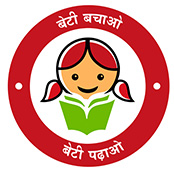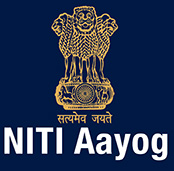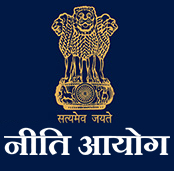- Overview
-
The Vertical aims for a transformation of Indian agriculture, led by innovation, for improved nutrition and income of farmers, through sustainable as well as inclusive growth.
- Core Functions
-
Policy Design and Analysis
The Vertical designs new programmes and policies for agriculture and allied sectors to address emerging challenges and harness upcoming opportunities. It also provides inputs on key policy documents such as Cabinet Notes, CCEA Notes, EFCs, and SFCs, among others.
Member (Agriculture) regularly provides strategic inputs to the Prime Minister's Office and other Ministries and participates in important policy decisions related to the sector.
Research and Knowledge Exchange
The Vertical conducts both in-house research studies and partners with research institutes and academia. These studies analyze emerging issues, such as problems faced by farmers, food security, and the impact of various policies and developmental programmes.
Policy Advocacy
The Vertical represents NITI Aayog in international, national and regional fora and media interactions to create a suitable environment for the proper understanding of Government's policies and initiatives.
Stakeholder Consultations
Collecting and collating stakeholder views form an integral part of the Vertical's work, as several key documents, such as the Vision document, are based on extensive stakeholder consultations.
Working with States
The Vertical monitors trends, changes and undercurrents in agriculture and the rural economy of various States. It offers suggestions and advice for addressing challenges faced by the farmers and the sector. Activities range from consultations on key policy issues, solving bottlenecks with Central Ministries to monitoring the progress of key schemes.
Working with Line Ministries
The Vertical works closely with the relevant Line Ministry to design interventions, accelerate development, and attain the vision of building a New India. It also provides feedback on implementation of issues and the output of various Central schemes.
- Partners
-
Research Institutes/Organisations
-
Food and Agriculture Organization
-
World Bank
-
Bill and Melinda Gates Foundation
-
World Food Programme
-
Institute for Competitiveness
-
CIRAD
-
Network for Certification and Conservation of Forest
-
The Nature Consultancy
-
World Agroforestry, World Resource Institute
-
International Bamboo and Rattan Network
-
Indian Council of Forestry Research and Education
-
Indian Council of Agricultural Research-Central Agroforestry Research Institute Space Applications Centre
-
Indian Space Research Organization
-
National Remote Sensing Centre
-
Indian Council of Agricultural Research-National Academy of Agricultural Research Management
-
Indian Agricultural Research Institute
Private Sector
-
ITC
-
Amul
-
Microsoft
-
CropData
-
Neural Blocks
-
Milk Mantra
-
Big Basket
-
Growmore Biotech Ltd
-
Cluster of Handicrafts in Bamboo Value Addition and Research (CHIVAR)
-
Bamboo Forum of India
-
Bengal Veneer Industries
-
- Line Ministries
-
-
Department of Agriculture and Farmers Welfare
-
Department of Animal Husbandry and Dairying
-
Department of Fisheries
-
Department of Cooperation
-
Department of Agricultural Research and Education
-
- Reports
- Projects
-
Promotion of Natural Farming
NITI Aayog's strategy to promote natural farming has been multidimensional. First, leading experts were invited to share their views with senior Government officials of both Central and State Governments. Second, various practices of natural farming were documented and scientifically validated for replication across the country, with the help of knowledge partners.
-
A High-Level Roundtable on Agroecology was organised virtually, with the Hon'ble Union Minister of Agriculture and Farmers' Welfare, the Principal Scientific Adviser to the Government of India, and leading international experts from the FAO, WWF and CGIAR.
Experts provided evidence from the latest studies and cutting-edge research as well as practical experience. Their analysis showed that natural farming and other agroecological approaches such as organic agriculture hold great promise for Indian agriculture. This would ensure farming that is not just productive but truly regenerative and sustainable.
-
The National-Level Consultation on the ‘Principles and Practices of Bharatiya Prakritik Krishi Paddhati or Natural Farming' was attended by the Hon'ble Union Minister of Agriculture and Farmers' Welfare, the Governors of Gujarat and Uttar Pradesh, international experts from the FAO and UN, as well as representatives of farmers' organizations. As many as 600 participants attended the two-day consultation.
During the deliberations, the multiple benefits of natural farming were highlighted by practitioners. For example, increased farmers' incomes, resilience to extreme weather events, improvement in soil fertility, increased organic carbon content, savings on agri-inputs, significant reduction in greenhouse gas emissions, and increase in quantity and quality of produce.
Follow-up meetings were held to chart the way forward, which included the preparation of success stories and the collection of empirical evidence for scientific validation.
-
National Dialogue on Enhancing Farmers' Income, Nutritional Security and Sustainable Food Systems: NITI Aayog, Ministry of Agriculture and Farmers' Welfare, and FAO initiated a national dialogue in 2019 for facilitating the transformation of Indian agriculture. A steering committee was formed under the Chairmanship of Prof. Ramesh Chand, Member, NITI Aayog, and domain experts from relevant fields. So far, the committee has held six meetings and decided on priority areas. The first round of the dialogue process was held virtually between 19 and 22 January 2021. The second round will be held in mid-2021 to consolidate ideas and recommendations for the way forward.
-
Policy Paper on ‘A New Paradigm for Indian Agriculture': This paper examines the structural transformation of India's economy. It provides evidence of mounting unsustainability in agriculture and highlights that a growing population and the threat of climate change necessitate higher productivity and diversification. The goals of sustainability and productivity can emerge as trade-offs to policymakers. The paper calls for a new paradigm in Indian agriculture through the adoption of agroecological principles at scale. The paper has been peer-reviewed by renowned agriculture economist Dr Bruno Dorin of CIRAD. It is in the final stage of completion.
-
Blockchain for Natural Farming: Lack of quality produce and traceability have hampered India's food exports, apart from disincentivising growers. Blockchain technology can help bridge this gap. To pilot such an initiative, the Agriculture Vertical, in consultation with the Frontier Technologies Vertical, has been working with Neural Blocks, a start-up that provides blockchain-based solutions. A pilot project has been launched in Himachal Pradesh, with the support of the State Government, in providing data. Apple has been chosen as the first crop.
-
Website on Natural Farming: A dedicated website on natural farming is being developed by NITI Aayog. The website will show natural-farming initiatives taken by different States, related schemes, guidelines, success stories, etc.
Agriculture Transformation Index
NITI Aayog is working on an Agriculture Transformation Index, which will measure the performance of States across six pillars: inputs, sustainability, productivity and diversification, policy, preservation, processing and exports, and farmers' income and welfare. The index is aimed at capturing the new policy paradigm in agriculture, at the core of which are sustainable intensification and increasing farmers' income.
Farm-to-Table: Driving India's Agriculture Sector Digitally
A meeting of private-sector experts was convened by NITI Aayog to draw a roadmap for the digital transformation of India's agriculture sector. The group, led by ITC, presented its ideas and a roadmap for the implementation of ‘Krishi Neev' to the Hon'ble Prime Minister in August 2020. Four pilots are currently underway and expected to be completed soon. The pilots include farm-advisory services, price prediction and blockchain for quality certification.
Agriculture Dashboard
The development of a dynamic agriculture dashboard is underway that will track State-wise data on select indicators such as weather, production, arrivals, etc. The dashboard will aggregate existing sources of agriculture and will be dynamically updated through APIs.
Documenting Initiatives of States in Adopting Agri-Reforms
NITI Aayog, in collaboration with the Ministry of Agriculture and Farmers' Welfare, is tracking the implementation status of marketing reforms by State Governments, to identify issues hampering their adoption.
Promotion of Agroforestry and Wasteland Greening
A policy paper on identifying bottlenecks in the development of agroforestry in the existing National Agroforestry Policy is currently being prepared. The recommendations are being made through a consultative process, involving international institutes, think tanks and Line Ministries.
Bamboo as an Alternative Source of Wood
Research over the past decades has demonstrated bamboo as a viable alternative to wood and other traditional materials in construction and infrastructure works. A policy paper is being prepared to promote the development of the bamboo industry, identifying bottlenecks and offering policy recommendations.
Roadmap for Self-Sufficiency in Oilseeds
Through data analysis, interaction with experts and review of literature, NITI Aayog has formulated a draft roadmap for self-sufficiency in oilseeds. The findings have been shared with the Ministry of Agriculture and Farmers' Welfare for finalisation of the policy.
Research Study on Waste to Wealth
NITI Aayog, in collaboration with ICAR-IARI, is conducting a comprehensive research study to develop technologies to convert crop bio-waste into farm compost, which is economically viable, to reduce stubble-burning.
-
- Bamboo Workshop
-
Presentations
S.NO Title Link 1 Technical Session 1 - Bamboo - Tissue culture and Micropropagation - Dr. EM Muralidharan Link 2 Technical Session 1 - Bamboo cultivation practices and production potential - Shri Anand Fiske Link 3 Technical Session 1 - Bamboo plantation and produce opportunities and constraints - Dr. Abhinav Kant Link 4 Technical Session 1 - Commercial Bamboo Varieties …he different states of India - Shri Syed Salim Link 5 Technical Session 2 - Challenges and path ahead to…il engineering material - Prof. Supratic Gupta Link 6 Technical Session 2 - Engineered bamboo structures…e changer in rural economy - Dr. Suresh Bhalla Link 7 Technical Session 4 - State Best Practices _ Area …ective _ North East India - Shri Samir Jamatia Link 8 Technical Session 2 - Incentives and Way Forward for promotion of Bamboo - Smt. Chhavi Jha Link 9 Technical Session 2 - International Experience in Bamboo - Ar. Neelam Manjunath Link 10 Technical Session 2 - Potential of bamboo based f…dization and Safety - Prof. Nirmala Chongtham Link 11 Technical Session 2 - Techno-Economic feasibility of Indian Bamboo - Smt. Sangeeta Baksi Link 12 Technical Session 3 - Bamboo for fibre and lifestyle products - Shri Yogesh Shinde Link 13 Technical Session 3 - Bamboo for Pulp and Paper - Shri Sanjeev Jain Link 14 Technical Session 3 - Bamboo in Agriculture and ancillary industries - Shri Rahul Saxena Link 15 Technical Session 3 - Bamboo in Green Energy _ Cha…nol and activated carbon - Shri Prashant Kumar Link 16 Technical Session 3 - Bamboo innovative products a…uses in different sectors - Shri Sanjeev Karpe Link 17 Technical Session 3 - Bamboo wood for Furniture and ancillary industries - Shri Neeraj Mutha Link 18 Technical Session 3 - Bamboo wood for high – end design Architecture - Shri Prasanth Srinivas Link 20 Technical Session 4 - Experience for Farmer Producer Organizations - Shri Tarun Pant Link 21 Technical Session 4 - Roadmap of Round Bamboo Stick Market - Shri Pratap Goswami Link 22 Technical Session 4 - State Best Practices _ Area Coverage, Variety and Industry Prospective _ Madhya Pradesh - Dr. Uttam Kumar Subuddhi Link 23 Technical Session 4 - State Best Practices _ Area …pective _ Maharashtra - Shri. M. Srinivasa Rao Link 24 Technical Session 4 - State Best Practices _ Area …ective _ North East India - Shri Dina Chhangte Link - National workshop on Innovative agriculture
-
S. No. Title Download 1. Technical Session II 
2. Technical Session III 
3. Technical Session IV 
- The Mapping & Exchange Of Good Practices (MEGP) Initiative For Millets Mainstreaming In Asian And African Countries
- Who's Who
-
Name Designation Email ID Dr. (Ms.) Neelam Patel Programme Director neelam[dot]patel[at]gov[dot]in Dr. Babita Singh Senior Consultant singh[dot]babita[at]nic[dot]in Ms. Batana Anuradha Senior Research Officer anuradha[dot]batana[at]nic[dot]in Sh. Sanjay Srivastava Director - Dr Tanu Sethi Sr. Associate tanu[dot]sethi[at]gov[dot]in Dr. Harshika Choudhary Consultant Grade I harshika[dot]123[at]nic[dot]in Sh. Shiv Charan Meena Research Officer shivam[dot]meena[at]dcmsme[dot]gov[dot]in Ms. Manjisha Sinha Consultant Grade-I manjisha[dot]sinha[at]govcontractor[dot]in Sh. Pavan Raj G H Consultant Grade-I pavan[dot]raj[at]nic[dot]in Sh. Paremal Vijaysingh Banafarr Young Professional paremel[dot]banafarr[at]nic[dot]in Mayuri Gadhawe Young Professionall ma[dot]gadhawe[at]niti[dot]gov[dot]in
Agriculture and Allied Sectors
 National Portal Of India
National Portal Of India 


